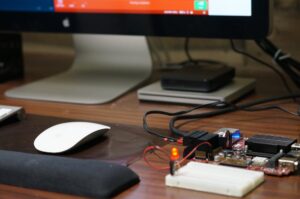Thisis a comprehensive and easy to read example C code designed to work alone or included as a library for dealing with general purpose I/O via the sysfs interface in Linux. It can easily be applied to any computer which utilizes the GPIO sysfs interface (both pro and maker boards). Getting started is a breeze. You just need to decide if you’re going to use it as a library, including it into your existing code, or as a stand-alone utility. We’ll talk about both in this article, but first and foremost, here’s the source code we’ll be working with:
https://github.com/embeddedts/gpio-sysfs-demo
Continue reading “Robust C Library and Utility for GPIO sysfs Interface in Linux”


